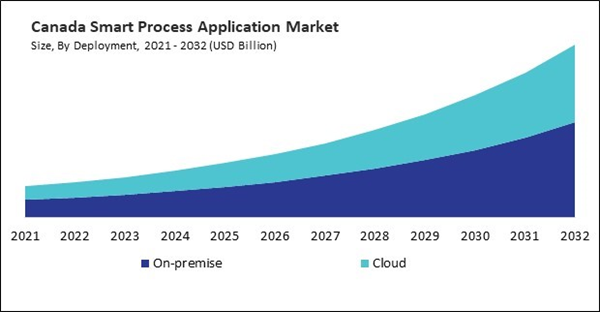The US market dominated the North America Smart Process Application Market by country in 2024, and is expected to continue to be a dominant market till 2032; thereby, achieving a market value of $60.35 billion by 2032. The Canada market is experiencing a CAGR of 17.9% during 2025-2032. Additionally, the Mexico market is expected to exhibit a CAGR of 17.1% during 2025-2032.
As organizations become increasingly reliant on digital processes, the demand for SPAs is also being propelled by the need for greater visibility, transparency, and control over business operations. Through intuitive dashboards and real-time analytics, SPAs provide stakeholders with comprehensive insights into process performance, bottlenecks, and opportunities for optimization. This visibility enables proactive monitoring and management of key performance indicators (KPIs), ensuring that processes align with organizational objectives and service level agreements (SLAs). Additionally, SPAs support robust compliance and audit trails, making it easier for enterprises to demonstrate adherence to regulatory requirements and industry standards.
Moreover, the trends shaping the smart process application market are closely linked to the broader evolution of intelligent automation and digital transformation initiatives. One of the prominent trends is the convergence of SPAs with emerging technologies such as natural language processing (NLP), chatbots, blockchain, and the Internet of Things (IoT). The integration of NLP and chatbots with SPAs is transforming user interactions by enabling conversational interfaces and automating customer support, HR inquiries, and IT helpdesk functions.
The United States stands as a global leader in the Smart Process Application (SPA) market, benefiting from its strong culture of innovation, advanced digital infrastructure, and government support for digital transformation. From early investments in information technology and automation to recent policies driving cloud adoption and artificial intelligence, the U.S. public and private sectors have set benchmarks for process modernization. Federal initiatives such as the “Federal Cloud Computing Strategy” (Cloud Smart) and the “21st Century Integrated Digital Experience Act” have accelerated SPA implementation in government, streamlining citizen services and administrative workflows. Meanwhile, private sector firms, especially in finance, healthcare, manufacturing, and retail, use SPAs to increase productivity, ensure compliance, and deliver superior customer experiences.
Mexico’s Smart Process Application (SPA) market is growing rapidly, supported by government digitization efforts and rising business demand for automation and efficiency. The federal “Agenda Digital Nacional” and the “Gobierno Digital” initiatives have accelerated SPA adoption in the public sector, particularly for e-government, tax administration, and public health. As Mexican enterprises face competitive pressures and shifting consumer expectations, SPA solutions have become essential for streamlining internal operations, managing compliance, and delivering better digital services.
List of Key Companies Profiled
- Wipro Limited
- Dell Technologies, Inc.
- IBM Corporation
- SAP SE
- Open Text Corporation
- Pegasystems, Inc.
- Salesforce, Inc.
- Microsoft Corporation
- Siemens AG
- General Electric Company
Market Report Segmentation
By Deployment
- On-premise
- Cloud
By Offering
- Solution
- Enterprise Content Management
- Business Process Management
- Business Intelligence and Analytics
- Customer Experience Management
- Other Solution Type
- Services
By Enterprise Size
- Large Enterprise
- Small & Medium Enterprise
By End Use
- Retail
- BFSI
- IT & Telecom
- Healthcare
- Government, Energy & Utilities
- Manufacturing
- Other End Use
By Country
- US
- Canada
- Mexico
- Rest of North America
Table of Contents
Companies Mentioned
- Wipro Limited
- Dell Technologies, Inc.
- IBM Corporation
- SAP SE
- Open Text Corporation
- Pegasystems, Inc.
- Salesforce, Inc.
- Microsoft Corporation
- Siemens AG
- General Electric Company









